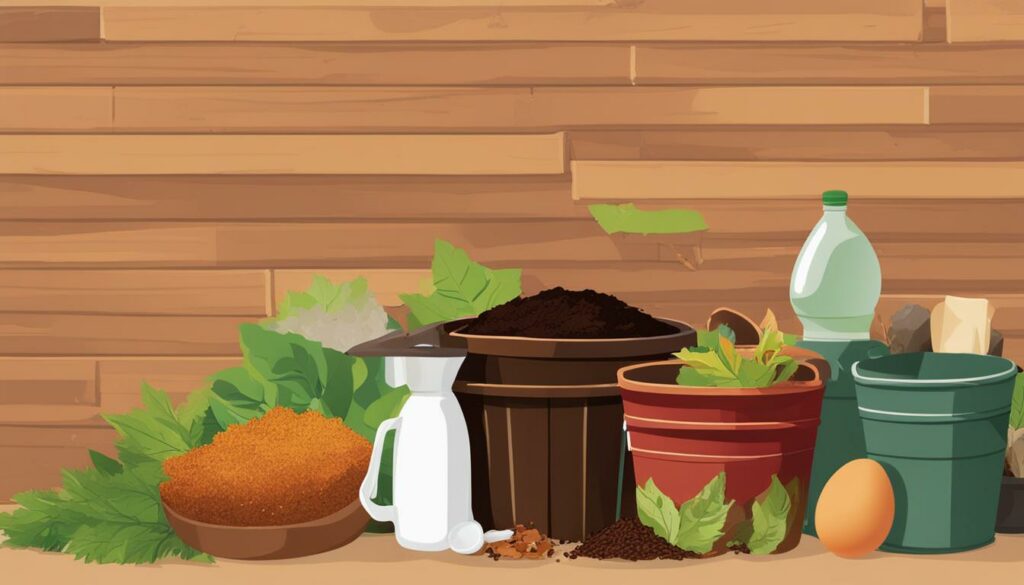Composting is often associated with sprawling gardens and vast outdoor spaces. But what if you live in an apartment without a backyard? Can you still compost?
The answer is a resounding YES!
Composting in an apartment is not only possible but also an incredibly rewarding way to reduce waste and nourish your plants. In this article, we will guide you through the ins and outs of apartment composting, sharing tips and tricks for beginners like you. So, grab your composting toolkit and get ready to turn your small living space into an eco-friendly haven!
But first, let’s address the elephant in the room: Can composting really be done in an apartment? What if you don’t have access to outdoor space or a backyard? Stay tuned as we debunk common composting myths and reveal the secrets to successful indoor composting.
What is Compost?
Compost is a natural substance that results from the decomposition of organic matter. It is created through an aerobic process that requires a balance of “green” and “brown” materials. The process of decomposition involves the breakdown of organic materials into simpler compounds by microscopic organisms such as bacteria, fungi, and insects. This decomposition process is facilitated by the availability of oxygen, moisture, and the right temperature.
During composting, microorganisms consume the organic matter, breaking it down into carbon dioxide, water, and mineral-rich humus. This high-nutrient compost is an excellent source of organic matter and can be used to enrich soil, promote plant growth, and improve overall soil fertility.
The composting process typically takes a couple of months or longer, depending on various factors such as the size of the composter, temperature, and types of materials used. It is important to maintain the right balance of “green” and “brown” materials to ensure proper decomposition and prevent any unpleasant odors or the growth of harmful microorganisms.
Advantages of Compost
Compost offers numerous benefits for both the environment and gardeners. Here are some advantages of using compost:
- Improves soil structure and fertility
- Enhances moisture retention in the soil
- Reduces the need for chemical fertilizers and pesticides
- Increases plant growth and productivity
- Helps retain nutrients in the soil
- Reduces waste sent to landfills and decreases greenhouse gas emissions
Components of Compost
Compost is made up of various organic materials referred to as “green” and “brown” materials. Green materials are rich in nitrogen and are typically fresh, moist, and green in color. They include items such as vegetable waste, fruit scraps, coffee grounds, and grass clippings.
Brown materials, on the other hand, are high in carbon content. They are typically dry, brown, and more fibrous. Examples of brown materials include dry leaves, wood chips, straw, and shredded newspaper. The right balance of these materials is crucial for the successful decomposition and transformation of organic matter into nutrient-rich compost.
| Green Materials | Brown Materials |
|---|---|
| Vegetable waste | Dry leaves |
| Fruit scraps | Wood chips |
| Coffee grounds | Straw |
| Grass clippings | Shredded newspaper |
What Can and Cannot Be Composted in an Apartment?
When it comes to composting in an apartment, it’s essential to know what items can and cannot be composted. Properly composting the right materials will help you avoid odors and unwanted pests in your living space. Here’s a list of compostable items that can be safely composted in your apartment:
- Vegetable scraps
- Coffee grounds
- Tea bags (remove staples if present)
- Fruits and fruit peels
- Eggshells
- Paper (shredded, non-glossy)
- Cardboard (cut into small pieces)
- Napkins and paper towels (without any chemical residues)
- Yard waste (grass clippings, leaves)
While these items are compostable and can help create nutrient-rich soil, there are certain items that should be kept out of your compost bin. Avoid composting the following:
- Meats and animal products
- Dairy products
- Fats, oils, and grease
- Bones
- Processed foods
- Plastic and synthetic materials
- Man-made chemicals
- Pet waste
Composting these items can lead to unpleasant odors, attract insects and rodents, and even disrupt the composting process. By sticking to composting organic waste and avoiding the items mentioned above, you can successfully compost in your apartment without any issues.
To help you visualize the compostable and non-compostable items, here is a simple table:
| Compostable Items | Non-Compostable Items |
|---|---|
| Vegetable scraps | Meats and animal products |
| Coffee grounds | Dairy products |
| Tea bags (remove staples if present) | Fats, oils, and grease |
| Fruits and fruit peels | Bones |
| Eggshells | Processed foods |
| Paper (shredded, non-glossy) | Plastic and synthetic materials |
| Cardboard (cut into small pieces) | Man-made chemicals |
| Napkins and paper towels (without any chemical residues) | Pet waste |
| Yard waste (grass clippings, leaves) |

Remember, composting the right materials will not only help you reduce waste but also provide you with nutrient-rich soil for your plants. Be mindful of what you compost in your apartment and enjoy the benefits of sustainable living!
How to Build an Apartment-Friendly Compost Bin
Building an apartment-friendly compost bin is a simple and cost-effective way to turn your food scraps and organic waste into nutrient-rich compost. With just a few basic materials, you can create a composting system that fits perfectly in your small living space.
To build your apartment compost bin, you will need:
- Plastic containers with lids
- A drill
- Soil
- Shredded newspaper or other absorbent materials
Follow these steps to create your apartment-friendly compost bin:
- Choose a set of plastic containers with lids that are large enough to hold your compost materials. These containers will serve as the main compartment for your compost.
- Using a drill, create several small holes in the containers to allow for proper airflow. These holes will help facilitate the composting process by providing oxygen to the microorganisms responsible for decomposition.
- Add a layer of soil at the bottom of the container. This will introduce beneficial microorganisms that aid in the decomposition process.
- Layer shredded newspaper or other absorbent materials on top of the soil. These materials will help maintain proper moisture levels and prevent unpleasant odors.
- Begin adding your compostable materials, such as fruit and vegetable scraps, coffee grounds, and eggshells. Avoid composting meats, dairy products, fats, and oils, as these can attract pests and cause unpleasant smells.
- Mix or turn the contents of the compost bin regularly to ensure proper decomposition. This can be done by gently stirring the materials with a garden fork or shovel.
- Regularly empty the liquid that accumulates in the bottom of the bin. This liquid, known as compost tea, can be diluted and used as a natural fertilizer for your plants.
- Clean the compost bin periodically to prevent mold growth and reduce the potential for odors. You can rinse the container with water and a mild detergent or vinegar solution.
By following these steps, you can easily build your own apartment-friendly compost bin and start turning your food waste into nutrient-rich compost for your indoor plants or community gardens.
Indoor Composting Methods for Apartments
Composting in an apartment doesn’t have to be limited to outdoor spaces. There are several indoor composting methods that are ideal for apartments, allowing you to reduce waste and create nutrient-rich compost right in your own home. Let’s explore some of the apartment composting options:
1. Worm Bins
A worm bin, also known as vermicomposting, is a popular indoor composting method. It utilizes worms to break down organic waste, including food scraps and paper, into nutrient-rich compost. Worms in the bin eat the organic matter, digest it, and produce castings, which are a valuable soil amendment. Worm bins are compact, odor-free, and can fit easily in apartments.
2. Bokashi Buckets
Bokashi composting is another indoor composting method suitable for apartments. It uses a Bokashi bucket, where organic waste is fermented with the help of microbial activators. This process accelerates decomposition and eliminates odors. Bokashi buckets can handle a wide range of materials, including meats and dairy products, which are not recommended for traditional composting. After the fermentation process, the Bokashi waste can be buried or added to an outdoor compost pile to complete the composting process.
3. Electronic Composters
If you prefer a hands-free approach to indoor composting, electronic composters are a convenient option. These compact devices use heat and mechanical mixing to accelerate the composting process. They can turn food scraps into compost overnight or within a few days, depending on the model. Electronic composters are odor-controlled and can be kept in apartments without any unpleasant smells.
These indoor composting methods provide apartment dwellers with convenient options for reducing organic waste and creating nutrient-rich compost. Whether you choose a worm bin, a Bokashi bucket, or an electronic composter, you can actively contribute to sustainable living while maximizing your apartment’s composting potential.
By embracing indoor composting methods, apartment dwellers can enjoy the benefits of composting without the need for a yard or outdoor space. These methods are easy to maintain, odor-free, and can fit seamlessly into apartment living. Start composting in your apartment today and make a positive impact on the environment and your plants!
Alternative Options for Apartment Composting
Composting in an apartment is not the only option for disposing of organic waste. There are several alternative methods that can be explored to ensure your food scraps and other compostable materials are put to good use.
Community Gardens
Community gardens are a great way to connect with like-minded individuals and contribute to a sustainable environment. Many community gardens have designated composting areas where you can drop off your food scraps. By donating your compostable waste to these gardens, you not only reduce landfill waste but also provide valuable nutrients for the community’s plants and crops.
Municipal Composting Programs
Many municipalities now offer composting programs to their residents. These programs often provide compost bins or collection services specifically for organic waste. Check with your local government or waste management department to see if they offer municipal composting in your area. Participating in these programs is a convenient way to ensure your food scraps are diverted from the landfill and used for beneficial purposes.
Neighbors with Chickens
If you have neighbors who keep chickens, they may be more than happy to accept your food scraps as chicken feed. Chickens are natural composters and can easily consume many types of organic waste, including fruit and vegetable scraps, coffee grounds, and bread. Contact your neighbors and see if they would be interested in accepting your compostable waste for their chickens. It’s a win-win situation, as the chickens get a nutritious treat and you reduce your environmental impact.
Share Waste App
The ShareWaste app is a digital platform that connects people who have compost bins with those who need a place to deposit their organic waste. Simply download the app, create a profile, and search for composters in your area. You can then arrange to drop off your food scraps to individuals or community composters who are willing to accept them. This app is a convenient and efficient way to ensure your compostable waste is put to good use.
By exploring these alternative options for apartment composting, you can actively contribute to a more sustainable future while making the most of your organic waste. Whether it’s through community gardens, municipal composting programs, neighbors with chickens, or digital platforms like ShareWaste, there are various avenues available for recycling your food scraps responsibly.
Conclusion
Composting in an apartment is an eco-friendly and practical solution for reducing waste and creating nutrient-rich compost for your plants. With the right knowledge and tools, beginners can easily start composting in their small living spaces. By following this apartment composting guide, you can turn your organic waste into valuable compost while minimizing your environmental footprint.
One of the first steps to successful apartment composting is understanding the basics of composting itself. Knowing what can and cannot be composted and the ideal balance of “green” and “brown” materials is crucial. By ensuring a proper mix of organic waste, you can speed up the decomposition process and achieve optimal results.
Building an apartment-friendly compost bin is equally important. Using plastic containers with drilled holes for airflow and adding soil or shredded newspaper for moisture control can help maintain a healthy composting environment. Remember to regularly empty the liquid and clean the bin to prevent unwanted mold or odors.
If indoor composting doesn’t suit your needs, there are alternative options to consider. Community gardens, municipal composting programs, and even neighbors with chickens can often accept your food scraps. Additionally, there are waste-sharing apps like ShareWaste that connect composters with those who have organic waste to dispose of.
Embarking on your apartment composting journey may seem daunting, but with the right composting tips for beginners and apartment-friendly composting techniques, it becomes a rewarding and sustainable practice. Start composting today and make a positive impact on the environment, one compost bin at a time.


